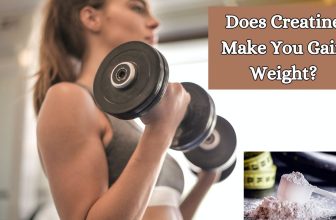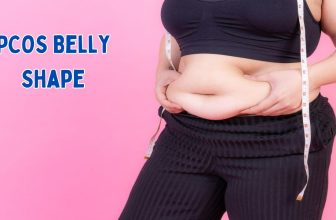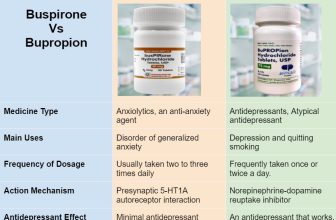Can Popcorn Cause Diarrhea? Let’s Find Out the Facts!
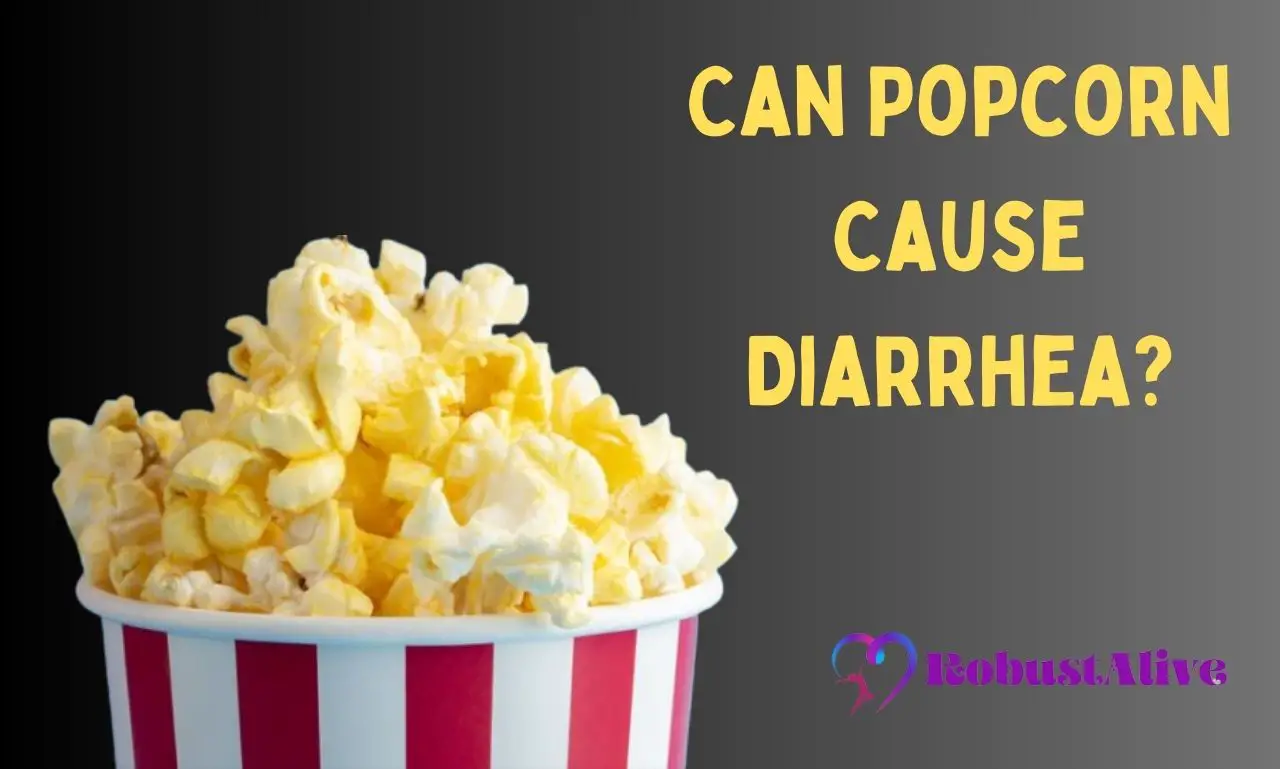
Popcorn is one of the most widely consumed foods in the world, which is no secret. It’s popularly consumed on special occasions and is acceptable as a regular snack. Moreover, this whole grain is one of the most nutrient-dense grains due to its numerous health advantages and nutrients.
But can popcorn cause diarrhea?
Because popcorn has a lot of insoluble fiber, consuming too much popcorn can make your stool loose and watery. Some people experience bloating, distention, and flatulence as popcorn contains insoluble fiber. If you experience these symptoms, going for soluble fiber meals such as psyllium, oats, apples, and citrus fruits may be preferable. Yet, those who desire to eliminate constipation may find consuming popcorn beneficial.
The pleasure and delight of viewing a movie are both enhanced by eating popcorn. But not everyone will enjoy popcorn, even though it is healthy. Popcorn may not be suitable for everyone with digestive issues, especially those with irritable bowel syndrome (IBS). Keep reading to learn why popcorn might cause diarrhea.
Why Popcorn Causes Diarrhea?
According to Clinical Gastroenterology and Hepatology, up to 5% of the population can suffer from chronic diarrhea at any moment. People suffer from diarrhea for various reasons. One of them is eating high-fiber food such as; popcorn.
Though fiber helps your digestive system function, it can occasionally be too effective. When fiber and water are combined, they form a gel that can aid in preventing constipation. But, if consumed in excess, it may also have a laxative effect.This is why if you eat lots of buttered popcorn in one sitting you may experience digestive distress.
What Type of Fiber Does Popcorn Contain?
According to USDA, 100-gram air-popped popcorn has 14.5 g of fiber. Hemicellulose, cellulose, and a trace quantity of lignan make up most of the thread in popcorn, making it insoluble. When consumed, insoluble fiber increases stool volume and speeds up the transit time of stools through the digestive tract since it is not digested.
Moreover, insoluble fiber promotes the production of gas, which in certain IBS sufferers can exacerbate the symptoms of bloating, distention, and flatulence. But you should be able to continue to enjoy popcorn if you don’t have issues with meals high in insoluble fiber.
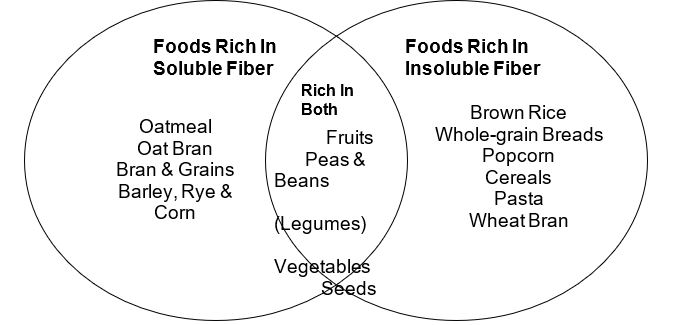
Venn Diagram Source: Oklahoma State University Extension
Substitutes for Popcorn:
After eating popcorn, many people have complained of diarrhea. So I’m going to provide several wholesome replacements for popcorn.
-
Kale snacks
Kale is a healthier alternative to popcorn. It is high in calcium, riboflavin, and vitamins A, C, and K. You can combine kale with olive oil and spices, roast it in the oven and eat it as a snack.
-
Seeds from roasted pumpkin
Alpha-linolenic acid (ALA) and other unsaturated fatty acids can be found in pumpkin seeds. There is strong evidence that eating pumpkin seeds as part of a balanced diet may benefit the heart and prevent cardiovascular disease due to their high ALA content.
Since roasted pumpkin seeds are crispy, you can substitute it for popcorn when watching movies. Most people generally consider pumpkin seeds safe, with rare instances of allergy. But before incorporating seeds into your diet, always see your doctor if you have sensitivities to seeds.
-
Both Black and Green olives
Olives are delicious snacks and excellent fiber, copper, and vitamin E sources. Olives are abundant in plant substances known as polyphenols, potent antioxidants. These substances’ advantageous effects include lowering the risk of chronic illnesses, including cancer and atherosclerosis.
One of the most widely used fermented foods is olives; by eating these foods, you introduce healthy bacteria and enzymes to your intestinal flora. This, in turn, improves the health of your gut microbiota and digestive system and boosts your immune system.
-
Edamame Beans
A small serving of edamame provides a lot of fiber, nine grams, or almost the same as four pieces of whole-wheat bread or 4 cups of steamed zucchini. The ratio of protein to carbohydrates is practically equal. It has about 10% of the Daily Value for the essential antioxidants vitamin C and A. It also offers a very high amount of iron for a plant food—roughly equivalent to a 4-ounce piece of roasted chicken breast.
Note: For best results, consult your dietician before switching popcorn for the food listed above.
Health Benefits of Popcorn
The nutritional benefits of popcorn and how it might help maintain a balanced diet have attracted increasing attention in recent years. In this post, we’ll examine the several health advantages of popcorn and how it fits into a nutritious diet. Popcorn is a treat that is OK to eat whether you enjoy it at home or the cinema.
-
Decreases Risk of Diabetes
Humans are known to gain significantly from whole grains in terms of health. A lesser risk of type 2 diabetes has been linked to eating whole grains, particularly for middle-aged men and women. Popcorn also has a low glycemic index (GI), which may make it easier to maintain stable blood sugar levels and prevent fluctuations from foods with a high GI. Type 1 and type 2 diabetes sufferers may benefit from diets high in low GI foods by seeing improvements in their lipid and glucose levels.
-
Good for Weight Loss
Many people find managing their weight difficult. A healthy snack option that can prevent weight gain is popcorn. This significant health advantage results from its high fiber and low-calorie count. Those who eat this snack may feel fuller than they would after eating a less healthful, fattier snack.
-
Reduces the Chance of Heart Disease
The risk of coronary heart disease and cardiovascular disease has been proven to be reduced by consuming a lot of fiber, which is present in popcorn. Popcorn is an excellent choice if you need a snack that helps you meet your daily fiber requirements because the thread is crucial to a balanced diet.
Healthy Popcorn Recipe
Popcorn can be made in various tasty and nutritious ways. This recipe will look at how to produce excellent, healthy, and healthful popcorn. With just a few essential ingredients, you can make a guilt-free snack that satisfies your appetites without endangering your health.
Let’s start popping, then!
Ingredients:
- Popcorn kernels, 3/4 cup
- Coconut oil, three tablespoons
- Salt as desired,
- one pinch of ground cinnamon, or as chosen more
Direction:
Step 1: Heat the coconut oil over high heat in a big pot. Drop three popcorn kernels into heated oil, cover with a lid, and cook until one kernel pops. Pour in the remaining popcorn after removing the cover. Put the pot’s lid back on and cook the popcorn, shaking it back and forth over the burner for about 5 minutes, or until 1 to 2 seconds between each pop.
Step 2: Transfer the popcorn to a big bowl immediately, then cover it with honey in a uniform layer. Sprinkle popcorn with salt and cinnamon, then evenly coat with your hands.
Nutrition Value of The Above Popcorn Recipe:
| Quantities Per Recipe: 6
175 Calories |
Daily Value (%) |
| Sodium 1mg | 0% |
| Total Amount of Fat 8g | 11% |
| Fat ( Saturated) 6g | 32% |
| Fiber (Diatery) 4g | 13% |
| Carbohydrate 24g | 9% |
| Sugars 6g | |
| Calcium 5mg | 0% |
| Iron 1mg | 4% |
| Protein 3g | |
| Potassium 77 mg | 2% |
Note:
- A 2,000-calorie diet is used to get the percent daily values. Based on your daily need for calories, your figures may be more significant or lower. Not all ingredients have nutritional data available.
- Before making this dish for your use, please speak with your doctor or a certified dietitian if you are adhering to a medically imposed restrictive diet.
Frequently Asked Questions (FAQs)
-
Can Popcorn Cause Intestinal Blockage?
Raw veggies, popcorn, and almonds are high-fiber meals that may be more difficult to digest after an ileostomy. When consumed in significant quantities, these foods can congeal. They then become impaled and clog the small intestine. You must know blockage symptoms and what to do in such a situation.
-
How Much Popcorn is Safe to Eat in a Day?
Popcorn should be consumed in portions of 25–30g. While plain popcorn can be a low-calorie treat, watching your portion sizes is essential to avoid overeating. Flavored variants should only be consumed occasionally as a treat rather than as a regular element of a balanced diet.
-
What Happens When You Overeat Popcorn?
Because some people do not digest whole grains well or may consume too much of them, popcorn might result in gas and bloating, according to Real Nutrition’s Amy Shapiro, MS, RD. Shapiro advises limiting your servings, chewing your food thoroughly, and ensuring you drink water if this is the case.
-
Is Popcorn Good for Gut Bacteria?
According to a report from the Prostate Cancer Foundation, Popcorn contains a lot of inedible fiber because it is an uncooked whole grain.
Three grams of fiber are present in a 3-cup portion, a decent amount for a snack. fiber aids digestion and nourishes your microbiome, encouraging the “good bacteria” in your stomach to produce health-promoting substances.
-
How Much Fiber Intake is Healthy?
Men should strive for 30 to 38 grams of fiber daily, while women should try to consume at least 21 to 25 grams. Below are some common foods and their dietary fiber content. When purchasing packaged foods, look for the fiber content on the Nutrition Information label.
-
Is Popcorn Ok for An Upset Stomach?
As popcorn can cause diarrhea, it is better to avoid popcorn if you have diarrhea. Particularly spicy popcorn may increase stomach gas, aggravating the illness. Avoid butter on your popcorn whenever possible. Butter popcorn will make someone who has lactic intolerance even more miserable.
-
What to Do If I Get Diarrhea After Eating Popcorn?
Avoid eating popcorn and get the correct medicine for your diarrhea. It is suggested that you see a doctor.
Bottom Line:
So can popcorn cause diarrhea? It can cause diarrhea if consumed in large quantities. It’s crucial to be cautious of how much popcorn you eat and make sure it’s cooked properly. It is best to cut back on or stop eating popcorn if you have diarrhea or other gastrointestinal problems. Another thing, try to avoid adding butter to your popcorn if you are lactose intolerant. If the symptoms don’t go away, you should see a doctor.

